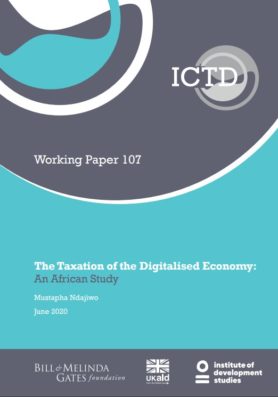Working Paper 107
The advent of digitalised business models has considerable potential to improve trade in Africa, however, it has greatly exacerbated the two central challenges of international tax. The first challenge is the definition of taxable presence, and the second is the allocation of business profits of multinational enterprises (MNEs) among the different jurisdictions where they operate. This has generated much debate and has seen the rise in unilateral measures in different jurisdictions. This paper is a case study of six African countries, namely Nigeria, Ghana, Senegal, Kenya, Rwanda, and Uganda. The paper examines the issue of nexus and profit allocation and the presence of digitalised businesses in Africa and recommends immediate and long-term options that are available to African countries. The paper reveals that the main problem of taxing highly digitalised businesses is not due to their lack of taxable presence in African countries but to the attribution of profits. The study further revealed that while generally, the six jurisdictions studied are considering the taxation of profits arising from the digitalised economy, efforts so far have focused on indirect taxation. The paper argues that African countries have the immediate advantage of collecting taxes from digitalised transactions through VAT due to its relative administrative ease and the existence of a legal framework, in comparison to corporate taxes. The paper also cautions African countries on transaction taxes, recommending that if African countries decide to impose taxes on transactions, they should be progressive to reduce the regressive impact. In the long term, the paper recommends that the best way forward for African countries would be to build on the G24 proposal under the Inclusive Framework on BEPS, and press for simple formulaic methods which would allocate profits fairly between countries based on real activities in each.
